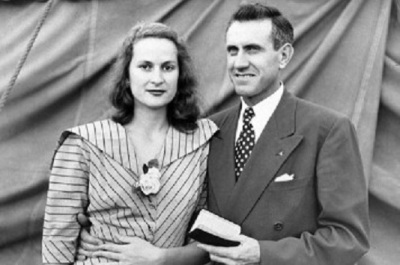Miracles for Unbroken's Louis Zamperini go beyond his war camp survival

BOONE, N.C. (Christian Examiner) – Franklin Graham has posted an online letter giving even more insight into the life and faith of Olympic star Louis Zamperini, whose tale of triumph while captive in Japanese prisoner of war camps has been documented in an Angelina Jolie film, "Unbroken," which was released during the holiday season.
Graham, president of the Billy Graham Evangelistic Association founded by his father, said there is much more to Zamperini's life than just being a war hero.
"He himself always said that the biggest and most wonderful miracles came after the war, and that part is not included in the new Hollywood movie," Franklin said.
After being freed following brutal torture in Japanese prison camps, he came home "filled with bitterness toward life and rage toward his captors," according to Graham. "He experienced constant nightmares, became a heavy drinker, had a violent temper, and nearly destroyed everything that mattered to him, including his marriage. His wife, who feared for her own safety and that of their little daughter, began preparing divorce papers."
Graham said a neighbor invited the couple to come to nearby Los Angeles "to hear a young, little-known evangelist named Billy Graham."
"It was 1949, and my father was preaching in a huge tent downtown at the corner of Washington and Hill streets," Graham said. "Louis wanted nothing to do with any evangelist, but his wife went anyway and her heart was changed by the power of the Gospel. She tore up the divorce papers and persuaded her husband to go with her a few days later. He did—then walked out during the meeting. She begged him to return another day. That time, while my father preached, Zamperini knew the Holy Spirit was working within him, and he resisted."
Graham said the moment the invitation hymn began to play that Zamperini grabbed his wife's hand and headed toward the exit.
"But in the aisle, overwhelmed by the realization of how broken his life had become, he turned around and gave his life to Jesus Christ in repentance and faith. He left the tent with God's complete forgiveness," according to Graham. "From that day forward, everything changed. He started reading the Bible. His nightmares disappeared, he gave up drinking, his hatred and violent anger melted away, and he began to live for Christ."
Graham said that Zamperini's salvation experience led him to want to reconcile with his Japanese tormentors. So he traveled to Japan, visited prisons that held war criminals, shared the Good News of Jesus Christ with many, and expressed forgiveness personally to any of his wartime captors that he could find.
News reports about the Zamperini's acts of forgiveness touched others gripped with hatred because of the war, and a movement of reconciliation resulted.
Graham said the power of God's love in Zamperini's life did not end in 1949.
"Right up to his death this past July at age 97, Zamperini never tired of telling people about the Savior," Graham said.
"Unbroken" was one of three movies that dominated the New Year holiday weekend. "The Hobbit: The Battle of Five Armies," a third installment in a series based on a J.R.R. Tolkien novel, and "Into the Woods," a musical compilation of fairy tales, were the other two.